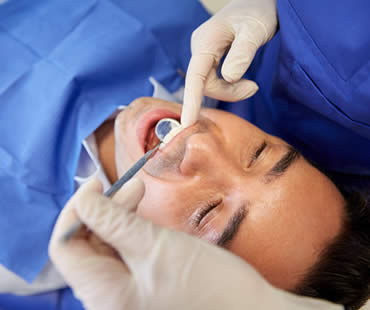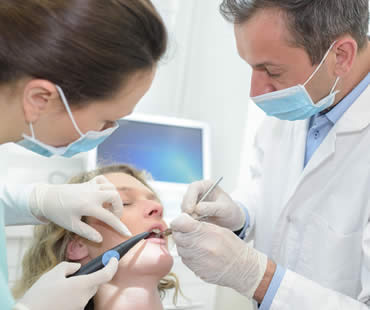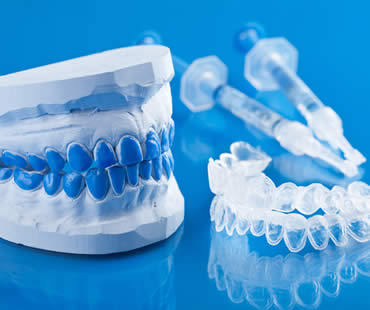
In order to ensure your comfort and ease during a dental procedure, sedation dentistry is often the best option. Many levels are available, including conscious oral sedation, inhaled sedation, and intravenous (IV) sedation.
Conscious oral sedation minimizes patient anxiety while allowing the patient to remain partially alert. Oral sedatives are used to accomplish minimal to moderate sedation. They come in the form of a pill, and are often taken within an hour of your dental procedure. Some dentists recommend a mild oral sedative the night before an appointment to ease anxiety and ensure a good night’s rest.
Depending on the dosage and on the individual recipient, an oral sedative can sometimes cause the patient to “doze off,” but the patient will never be fully unconscious and will awaken with a gentle shake. Even though you are never fully asleep during conscious oral sedation dentistry, you may not drive yourself home because you will not be fully alert.
Inhaled sedation utilizes nitrous oxide, also known as “laughing gas.” This gas is inhaled through a mask while your dentist controls the amount you receive. This type of sedation allows a patient to relax and to be fully comfortable, but to still be responsive. Nitrous oxide sedation has a tendency to wear off quickly. Because of this, you may be able to drive yourself home after your procedure.
IV sedation (sometimes known as “sleep dentistry”) provides the deepest, most relaxed sedation during dental procedures. Despite the name, IV/sleep sedation does not cause you to completely lose consciousness. Because the drugs used naturally produce a full or partial memory loss while active in your system, you may not remember anything that happened during your procedure. IV sedation is the fastest of the sedation dentistry methods. The amount of sedation is controlled by your dentist. You should not drive after IV sedation, as you may not be fully alert for a period of time.
Talk to your dentist about which sedation is right for you to ensure your dental procedure goes well and that you are comfortable throughout treatment.
Our dental office is located in Lawrence MA

Sedation dentistry is often hailed as a solution to all of a patient’s problems regarding dental therapies. It can address anxiety, fear, stress and pain. It can provide a comfortable experience for the dental patient, allowing the dental professional to work safely and quickly. As with any pharmacological agent, there are risks, and before you agree to any sedation dentistry option, it is smart to educate yourself about some of those risks.
While single doses of oral sedatives such as Valium or Halcion are unlikely to harm a patient, there are concerns regarding multiple doses of these drugs that could potentially cause a patient to be overly sedated, or even completely unconscious. Because each patient has a different metabolism, drugs can take between twenty minutes and an hour to become fully effective.
These time-delay issues are not problematic for inhaled sedation or for IV sedation, as these types of sedation dentistry are effective almost instantaneously. For oral sedation, however, a dentist who administers more than one pill could cause an overdose if the medicine kicks in at the same time. Most dentists lack both the equipment and the training to effectively and quickly address an overdose in a patient who is unconscious.
In 2000, a group known as the Dental Organization for Conscious Sedation was launched. Its purpose is to train dentists on sedation dentistry methods such as how to properly monitor a patient during a dental procedure to ensure that their heart rates and oxygen levels are healthy. Despite this, there are still concerns about adverse effects of adults with oral conscious sedation. There have been no reported adult deaths from overdosing; however, some children have died from oral sedation, leading to the practice being recommended only for adults.
If you are about to undergo a prolonged dental procedure, or if you are considering sedation dentistry to address personal anxiety or a dental phobia, look for a dentist who has received training in sedation dentistry and has high levels of experience to ensure that your procedure is as safe and comfortable as possible.
If you need a dentist in Lawrence MA contact us today

Nitrous oxide, otherwise known as laughing or happy gas, is a colorless and odorless gas that you inhale through your nose. The effects of nitrous oxide are a relaxed feeling and diminished pain, making it an ideal sedation option for many dental procedures. Advantages of sedation utilizing nitrous oxide include:
- The effects of nitrous oxide make their way to the brain in mere seconds, and the pain relieving properties develop in just minutes.
- Your sedation dentist can alter the level of sedation during treatment.
- Nitrous oxide can be administered for the exact amount of time it is needed to complete the procedure.
- Nitrous oxide has no negative after-effects because it is eliminated from the body within five minutes after the sedation is stopped.
- Your sedation dentist has complete control and is able to give incremental doses of nitrous oxide, eliminating the risk of accidentally overdosing.
- No injection is required, making nitrous oxide a very attractive option for patients with a fear of needles.
- The relaxing effects of sedation with nitrous oxide is known to eliminate or reduce gagging.
- Sedation with nitrous oxide is considered very safe and has no negative effects on other organs of the body.
There are a few potential disadvantages of sedation with nitrous oxide, including:
- Some patients may not achieve the desired level of sedation with the maximum amounts of nitrous oxide allowed.
- Patients who are mouth breathers, have claustrophobia, or have difficulty breathing through their nose may not be good candidates for nitrous oxide.
- If you are prone to nausea or a sensitive stomach, nitrous oxide may not be a good option.
Our dental office is located in Lawrence MA

Many types of cosmetic dentistry procedures such as crowns, bridges, tooth implants, or other invasive procedures require some kind of anesthesia in order to be performed in comfort for the patient. Even a procedure like porcelain dental veneers can be aided by the addition of some kind of sedation dentistry, especially if the patient is experiencing anxiety or fear regarding the treatment. For any patient seeking a more relaxed cosmetic dental experience, sedation dentistry presents several options.
Inhaled sedation, or nitrous oxide, is more commonly known as “laughing gas.” It is inhaled via a mask and is controlled by your dentist. It is a light sedation, and allows you to remain completely responsive and compliant to instruction. Nitrous oxide sedation wears off quickly; because of this, you may be able to drive yourself home after your treatment.
Conscious oral sedation reduces your anxiety while still allowing for responsiveness to requests and directions. Oral sedatives are typically prescribed in pill form, and can be taken up to an hour before your dental procedure. Some dentists believe that taking a mild oral sedative the night before treatment can alleviate anxiety and ensure proper rest. You should not drive yourself home if you have taken an oral sedative for your dental treatment. You will not be fully alert.
IV sedation is also known as “sleep dentistry.” It provides the most relaxed dental experience, allowing you to be deeply sedated while never completely unconscious. A natural effect of the drugs is full or partial memory loss of the time during its use, so you may have no memories of your procedure. You should never drive following IV sedation, and you may not be fully alert for several hours. Plan to go home, rest, and sleep.
Your cosmetic dentist wants you to be comfortable throughout your dental therapy and will know which sedation dentistry option is right for your particular cosmetic dentistry procedure. Talk to your cosmetic dentist today about any concerns you have regarding your treatment so that you may have the most positive, pain and anxiety-free experience possible.
We treat patients from Lawrence MA and the surrounding area

If you have just completed professional teeth whitening treatment, you probably want to protect your investment and extend the life of your shiny, bright smile. To enhance your healthy new smile and keep it white and bright, it’s important to follow a few simple guidelines:
- Do follow good oral hygiene practices by brushing and flossing regularly after every meal.
- Don’t drink colored beverages such as red wine, coffee, cola or tea immediately after treatment, and continue to avoid them whenever possible to prevent staining.
- Do drink beverages with a straw when you must drink dark-colored beverages to prevent the liquid from touching your teeth and causing stains.
- Don’t eat pigment-intense foods for several weeks after whitening. Berries, dark chocolate, soy sauce and other foods with a dark color can leave residue that leads to staining.
- Do use a gentle tooth whitening mouthwash after eating to rinse away food and debris that could cause staining and to keep your breath fresh.
- Don’t wear lipstick or colored gloss for at least one week after whitening treatment, as your teeth are still sensitive immediately after treatment and lipstick can leave pigments that will stain your teeth.
- Do use a whitening toothpaste to increase the results and aid in the longevity of your treatment.
- Don’t forget to eat a healthy diet and drink water to keep your teeth strong and vibrant.
A whiter smile can brighten your face and take years off your looks. By following these easy recommendations, you can extend the life of your whitening treatment and enjoy the benefits of your bright, new smile.
We treat patients from Lawrence MA and the surrounding area

Veneers are a terrific option to create a dazzling smile. These shells fit right over your real teeth to hide a variety of cosmetic problems. Veneers are typically made of porcelain, giving you a natural and long-lasting smile.
How are they applied?:
Once you and your dentist decide that veneers are right for you, a small amount of your tooth enamel will be removed so that they fit correctly. An impression of your teeth will be made and sent to a dental lab for the veneers to be custom made. When they are ready, you will return to your dentist to have the veneers attached to your teeth with a special adhesive.
What are the benefits?:
It is hard for others to tell you have veneers because they look very natural. They are shaped just for your smile, and you select the color. Veneers resist stains from things like coffee, red wine, and tobacco use. Veneers are also a great choice because they fit right over your own teeth, without requiring more extensive procedures.
Are there disadvantages?:
Some patients experience increased tooth sensitivity after getting veneers due to the minor enamel removal. Also, veneers are permanent and the process cannot be reversed. Another thing to keep in mind is carefully choosing your veneer color, so that your smile isn’t overly white or unnatural.
Are veneers right for everyone?:
Veneers are great for hiding chips, cracks, gaps, or uneven teeth. They are whiten teeth that haven’t responded well to other methods. Veneers may not work for patients with weak teeth from decay, large fillings, or fractures. Patients who grind their teeth or clench their jaws may also be poor candidates because consistent wear can crack or chip the veneers.
What about maintenance?:
Veneers last ten years or more with good care. Practicing proper dental hygiene is important to avoid decay of your teeth under the veneers. Avoid nail biting or chewing on hard items like ice or pencils, which may break the thin veneers. Normal brushing and flossing is acceptable, and regular dental checkups are important in maintaining good oral health.
If you live in the Lawrence MA area contact us today










